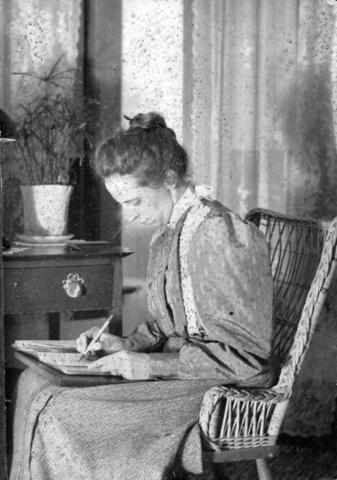“all cultures are oral and all cultures are literate”—Dr. Erika Paterson.

Osborne J. Pierce. Winifred Mabel Pierce sitting by a table writing in notebook. ca. 1900. Photograph. L.D. Taylor family fonds. searcharchives.vancouver.ca. Web. 22 May. 2014.
For anyone who do not consider themselves as luddites, it is apparent that technology has changed and expanded the concepts of communication and literature significantly over the last few decades. As Courtney MacNeil writes in her essay about orality, “orality is the dominant art form” in many cultures (MacNeil par. 13). And to consider literature, the written form as superior, and less “primitive” than spoken words, is an position that is likely to have stemmed from an ethnocentric, and eurocentric mindset (MacNeil par. 2).
Digital Literature
However, in addition to racism and eurocentricism, a disturbing implication of this hierarchical binary of literature and orality is that the concept is entirely ablelist. For anyone who is visually impaired, they would not be able to consume literature visually. Since literature, “by definition, is written down” and “textual”, does that mean that a blind person is never able to consume “literature”, and never be considered a “reader” (Paterson, Story)? This brings me to the first product of technological advancement that challenges this traditional idea of literature—audiobooks. This format, which is related to both the written and spoken word, is simply an audio recreation of a written, literary product. Audiobooks as a format undermine the distinction between the written and spoken word. Although the listeners/consumers of audiobooks are not made up exclusively of a visually-impaired audience, this technological product gives this marginalized group an access to “the written word”, which they might not have had before.
Self Publishing by Writers and Readers
The role of readers have also changed due to other developments that came with the internet. Traditionally, publishing has always involved a writer, a manuscript, an agent, a publisher, an ISBN number, and brick-and-mortar bookstores. However, as the tragic deaths of bookstores in the last ten years have indicated, the publishing paradigm is drastically changing. At present, one can write a poem or short story and upload it on Gumroad or Smashwords, or upload an ebook or audiobook through Amazon, and sell directly to potential readers. Being a writer and creator in this type of consumer-driven market means that they can write stories that do not necessarily have a mass market appeal, one that does not bring in enough profit to feed a company of a thousand employees. And as a reader of this time, one can seek out niche stories that cater much more closely to our own individual experiences, or literary preference. With the popularization of self-publishing and crowd-funding platforms (such as Kickstarter), the roles of readers/consumers are more influential and powerful than before. Readers and consumers can decide what to read because they can decide what is being sold to them.
Another form of self-publishing also takes place in the form of fan fiction writing. Listeners become readers when they take ownership of a story as they become writers themselves. Readers create their own story, by basing off on an existing story by another writer. They can also easily extend their reading experience of one fictional world through the writings created by other readers. With these new avenues, listeners can easily become readers, and writers. Although adapting existing stories is not an unique undertaking of our time, online sites (such as fanfiction.net) have certainly normalize the activity and created a community for readers-writers.
The www and social media platforms are not without their faults, but they have certainly provide additional access for some consumers and creators of literature, who had limited access in the past. The divergence from the traditional publishing and writing formats also meant that both the writing and reading experiences have diversified. While story-telling, and story-reading used to be an uniquely solitary activity in the past, the changes brought about by technology have given the activity of reading and writing much more possibilities for collaboration and community-building. As technology continues to impact the landscape of literature, the voices, experiences and imagination of stories will only continue to multiply, and hopefully, become more inclusive.
-Kayi Wong
Works Cited
Paterson, Erike. “Lesson 1:2.” ENGL 470A Canadian Studies Canadian literary Genres 99C Jan 2014. Web. 22 May 2014. <https://blogs.ubc.ca/engl470/unit-1/lesson-12/>.
MacNeil, Courtney. “orality.” The Chicago School of Media Theory. Web. 22 May 2014. <http://lucian.uchicago.edu/blogs/mediatheory/keywords/orality/>

One response to “1:2 How Technology is Altering the Roles of Listeners, Readers, and Writers”